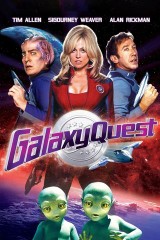Galaxy Quest Is Still the Best Movie about Fandom
20 years after it first premiered on Christmas Day of 1999, Galaxy Quest remains as charmingly earnest and eerily prescient as it ever was.

(Photo by DreamWorks)
Star Wars and the Marvel Cinematic Universe are currently two of the absolute biggest properties out there, so it might be easy to forget how much of a niche market sci-fi and comic-book fans in general would have represented just 20 years ago. Before San Diego Comic-Con became a huge phenomenon garnering coverage from pretty much every news outlet around, genre fans were often ostracized and mocked by mainstream media. Everything changed on Christmas Day of 1999, though, when we got an adventure-comedy that was not only a love letter to sci-fi shows like Star Trek, but also one of the first movies to embrace fan culture as something positive.
Galaxy Quest has a simple premise: what if aliens watched a sci-fi TV show from Earth and, believing it was real, asked the stars of the show for help in defeating an alien general? The film overcame production issues, including a change in directors from Harold Ramis to one who had barely done any feature films – and certainly no sci-fi movies – to become a cult hit that remains beloved decades later. It was even voted as one of the best Star Trek films by fans (higher than Star Trek Into Darkness). For it’s 20th anniversary, let’s walk in the suns of Warvan and explore why the film that got us to never give up and never surrender still endures to this day.
It Nails the Fan Convention Atmosphere

(Photo by DreamWorks)
Back in the ‘90s, pop culture conventions were niche events, not at all like the juggernauts akin to San Diego Comic-Con. When Galaxy Quest begins, we meet a group of washed-up actors from the eponymous fictional sci-fi TV series at one such convention. The vast majority of the fans are dressed up in cheap costumes based on their favorite characters, and they’re being amped up by a moderator who appeared in one episode (played by Sam Rockwell).
When the actors finally show up, it’s a sight that will be familiar to anyone who’s ever attended a similar event. The main actor in Galaxy Quest, Jason Nesmith (Tim Allen, arguably at the peak of his career), thinks too highly of himself, arriving late and soaking in all the attention from the fans while overshadowing his former co-workers. He occupies an entire table himself to sign autographs, while the rest of the cast are forced to share a smaller one. Alexander Dane (the late, great Alan Rickman), another actor on the show, has become absolutely fed up with making convention appearances and dealing with fan after fan coming up to him and repeating his famous catchphrase – to be fair, he did play Richard III.
Galaxy Quest depicts not only the absurdity and the pettiness of it all, but also the love that goes into attending these fan conventions. It also predicted the rise of these conventions in ways no one could have foreseen back in 1999. The film, clearly inspired by Star Trek and its loyal fanbase, came at a time when these types of events drew just a few thousand fans. Now, similar events have become so big that they now encapsulate the entirety of pop-culture, and the biggest one, the aforementioned San Diego Comic-Con, draws in over 100,000 fans annually, with major studios dropping big announcements and news outlets reporting on them.
It’s a Legitimately Good Sci-Fi Movie
One of the reasons Galaxy Quest remains as beloved as it is today is that, unlike many parodies and spoofs, it still makes the effort to be a good sci-fi movie in and of itself. After Harold Ramis left the project, a relatively unknown director named Dean Parisot signed on, and he made sure that the film looked better than just a cheap knock-off of old Star Trek episodes, which is what the original plan called for. In the newly released documentary Never Surrender, producer Mark Johnson says that Parisot directed the film as a drama, focusing on the characters and elevating the movie from operating merely as an extended joke.
That feeling of legitimacy comes from the fact that the technical aspects of the film make it look as good as most sci-fi movies from the time. Where Spaceballs and other parodies used their lower budget to make fun of the movies they’re parodying via cheaper recreations, Galaxy Quest aims to look as good as — if not better than — some of the Star Trek movies themselves. The special effects were created by Industrial Light and Magic, who had plenty of experience with the Star Trek franchise, and production designer Linda DeScenna, who did set decoration for the first Star Trek movie, also did the set decorations for Galaxy Quest.
Never Surrender offers the impression that there were some differences of opinion on how “cheesy” the movie should ultimately be, but the end result erred on the side of realism in order to properly sell the drama of the characters. The creature effects were even created by Stan Winston, known for his work on The Thing, Jurassic Park, Aliens and more. Winston and his team meticulously recreated both the cheap effects that would be appropriate for the show-within-the-movie, like the headpiece worn by Alan Rickman’s character, and the look of the “real” aliens, who might feel right at home in the bigger-budget Star Wars or Star Trek movies.
What makes Galaxy Quest special is that the movie is more than a parody, it’s an homage. It’s not funny at the expense of Star Trek and other sci-fi shows, and it doesn’t turn the staples of the genre into dick jokes like Spaceballs does. Instead, the film plays out as commentary, and it’s funny because everyone who worked on the movie loved and understood the genre and knew what elements were worth poking a bit of fun at, and what elements needed to be played completely straight.
It Pays Respect to Obsessive Fans
Arguably the main reason why Galaxy Quest became such a hit with fans is the way the movie approaches fandom. This is a movie that came out well before the mainstreaming of geek culture and Comic-Con, before Game of Thrones and superheroes became part of the day-to-day conversation. In other words, the nerds and sci-fi fans of 1999 were more accustomed to being portrayed as basement-dwelling, D&D-playing social misfits.
Galaxy Quest‘s treatment of this niche culture is best represented by Brandon (Justin Long), a trivia-obsessed fan who uses his knowledge of the show to guide Nesmith and his crew through a replica of the spaceship and save their lives. The movie doesn’t ostracize fans or treat their obsessive cataloguing of pointless details as a waste of time. On the contrary, it treats fan obsession as an asset, which was innovative and way ahead of its time.
The movie also depicts how fans can at times mistake fiction for reality. We learn that the Thermians, the aliens who have come to ask Nesmith and his fellow actors for help, have based their entire culture around the TV show, which they consider to be historical documents. Their enthusiasm at watching Nesmith step into the bridge is infectious, and they try to emulate the virtues of the characters in the show, while being completely blind to the many, many flaws of the extremely human people behind the costumes. By the end, their enthusiasm even manages to make the actors themselves embrace the heroic values their characters represent. Nesmith has been so immersed in the success his role had afforded him that he had never considered the positive effect it had on others, how he actually inspired them to do good, until the moment he becomes an actual hero – all thanks to some alien fans.
It Predicted the Power of Fan Culture

(Photo by DreamWorks)
After the actors save the Thermians and return to Earth, they are greeted by a wave of enthusiastic fans at the convention, who cheer at the sight of a literal spaceship crashing into the convention center. The ending of the film reveals that Galaxy Quest the TV show subsequently enjoyed a new wave of popularity that resulted in a revival series, thanks to the fans.
In this way, Galaxy Quest was again ahead of its time, as it came out before studios and networks realized the power of fans, but predicted that fans would be able to bring a beloved show back from the dead. It came out a mere three years before the Fox series Firefly, which was cancelled in 2003 after just one season and eventually saw a feature film continuation in 2005 after fans campaigned to bring it back.
Though only 20 years old, Galaxy Quest feels like the beginning of a new era for nerd culture. It coincided with the release of Star Wars: Episode I and the rise of blogs and sites that generated online debate. It foresaw the release of major geek-friendly film franchises that weren’t merely cult favorites but bona fide blockbusters, like X-Men, Spider-Man, Lord of the Rings, and Harry Potter. Fan conventions became gathering places for hundreds of thousands of like-minded individuals to camp out for days on end in order to catch a glimpse of their favorite pop-culture stars or a trailer for the new movie in their favorite franchise. Fans now not only drive the box office, but they manage to revive their favorite franchises much faster than they used to – just look at the near-instant renewal of Brooklyn Nine-Nine.
Galaxy Quest may not be widely regarded as a key player in the rise of geek culture and fandom, but it should be; its influence can be seen in everything from the 2009 Star Trek reboot to Marvel’s Guardians of the Galaxy movies. If there’s one thing this cult classic has taught us, it is to never give up, and never surrender.
Galaxy Quest was released on December 25, 1999.







